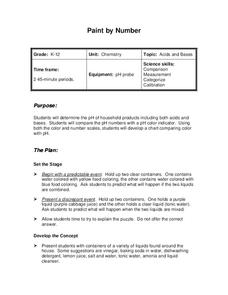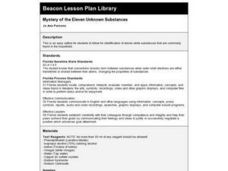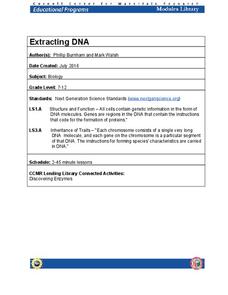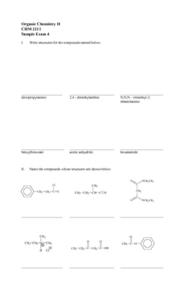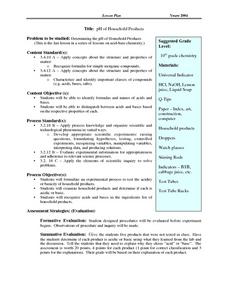Curated OER
Macromolecule Lab
During a macromolecule lab, young chemists perform multiple tests, including iodine starch tests, to determine if eight mystery foods contain lipids, sugars, or starches.
Curated OER
Chemistry: pH Probe
Students conduct a pH probe of various household products including both bases and acids. In groups, they use litmus paper to test such liquids as amonia, vinegar, and detergent to discover which are acids and which are bases. Finally,...
Curated OER
Geology Quiz- Common Rocks
For this earth science quiz worksheet, students attempt to guess the name of the rocks based on the descriptions that are given on the page. They determine the names of 10 rocks that are igneous or sedimentary, and check their work with...
Curated OER
I Wood if I Could
Tenth graders investigate the process of how specific products are made from trees. For this chemistry instructional activity, groups of students must choose among ice cream, bubble gum, paper, toothpaste and lipstick. They research,...
Curated OER
DNA Extraction From Onion
Students extract DNA from an onion using household equipment and supplies.
Curated OER
Mystery of the Eleven Unknown Substances
Fourth graders identify eleven white substances that are commonly found in the household. They, in pairs, perform experiments on a variety of substances, and must identify them based on the reactions they observe.
Curated OER
Interpreting pH
In this pH worksheet, students read about pH and the concentration of ions in solutions that are acidic and basic. They answer four questions about pH and determine the concentration of hydronium ions and the pH given concentrations of...
Curated OER
Water: The Neutral Substance
In this water worksheet, students read about hydrogen bonds in water and the differences in electronegativity between the oxygen atom and the two hydrogen atoms in water. Students answer four questions about the structure of water and...
Curated OER
DNA Blueprint for Life
Students isolate DNA from different food sources. In this biology instructional activity, students research DNA extraction. They analyze DNA stands collected from the lab, and compare the differences between each.
Virginia Department of Education
Soap, Slime, and Creative Chromatography
Do you think chromatography paper suffers from separation anxiety? Young chemists make soap, slime, silly putty, and experiment with chromatography in this instructional activity. The material includes clear instructions for each...
Virginia Department of Education
Aspirin Analysis
Laughter may be the best medicine, but aspirin is also important. Young chemists analyze aspirin tablets using titration in this lab experiment. They then repeat the entire experiment using a different aspirin brand.
Virginia Department of Education
Chemical Bonds
How are chemical bonds similar and how are they different? Provide your young chemists with the resources to more thoroughly understand the concepts of ionic and covalent bonds. Pupils research these topics, diagram examples of each...
Curated OER
Physical and Chemical Reactions - Factors Which Affect Reaction Rate
A total of five experiments lead chemistry pros to understand the difference between physical and chemical change. They also experiment with exothermic reaction factors that affect rate of reaction. The procedures are not written in the...
California Academy of Science
Coral and Chemistry
Using cabbage juice as a pH indicator, future scientists explore the effect of increasing carbon dioxide on the pH of the ocean and relate it to the health of coral reefs. Ideal for an earth or environmental sciences course, this lesson...
Cornell University
Extracting DNA
Uncover the basics of DNA structure through exploration activities. Collaborative groups build DNA models and recreate the process of replication. Then, using plant cells such as peas or strawberries, they extract a DNA sample.
Curated OER
Organic Chemistry II Exam 4
In this chemistry worksheet, students write the structures for the compounds listed at the top of the sheet. Then they name the compounds whose structures are illustrated. Students also write the mechanism for the reaction of methyl...
National Institute of Open Schooling
Electrochemistry
In an electrolytic cell, electrical energy is converted into chemical energy, the exact opposite of a battery! Lesson 15 in a series of 36 explores electrochemistry. Participants begin by reading and discussing oxidation/reduction...
Curated OER
pH of Household Products
Tenth graders are provided with a piece of paper such as index, art, construction, or computer coating it with a universal indicator. They use cotton swabs HCl and NaOH to draw a picture repeating the same process using lemon juice and...
Curated OER
Classification Number Two
A three-page quiz assessing budding biologists' understanding of classification. Middle-level learners may need a little additional time on this, but should be able to handle the concepts with ease.
Curated OER
Over-The-Counter Antacids
Students investigate the best antacids for sour stomachs. In this antacids lesson plan, students use different antacids, balloons and flasks containing 0.1 M HCl. They place the balloon with the antacids in them on top of the flaks and...
Curated OER
Alchemy and Chemical Symbols
In this alchemy worksheet, students read about how alchemists kept their experiment notes in secret code. Students design their own secret code for the given elements. This worksheet has 2 problems to solve.
Curated OER
Buffers
In this buffers worksheet, students identify the systems that could function as a buffer solution. Students determine the pH of a solution and the pH of the buffer. This worksheet has 6 problems to solve.
Curated OER
pH
Learners use a Colorimetric test to measure pH and gain the importance to life in an aquatic ecosystem pH is. They explore the dramatic effect pH level can have on a water body. Students test the pH level of many water samples.
Curated OER
Ka and Kb Calculations
In this solutions worksheet, students calculate the pH of given solutions or calculate the Ka or Kb for chemical compounds. This worksheet has 11 problems to solve.



